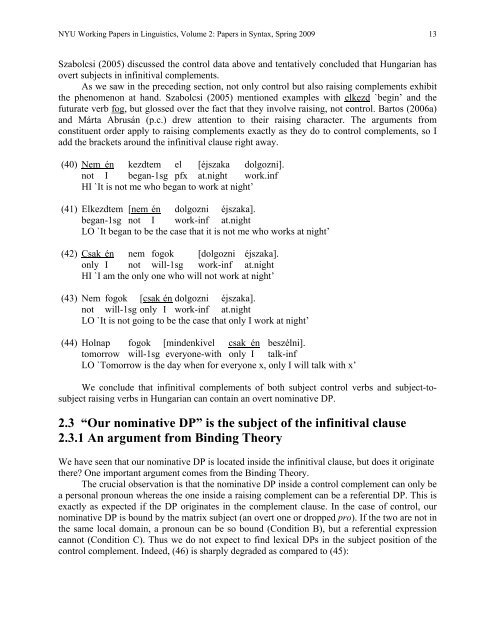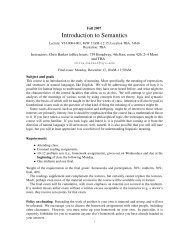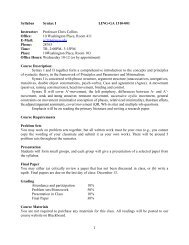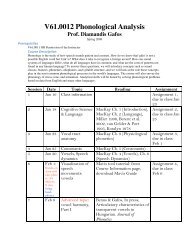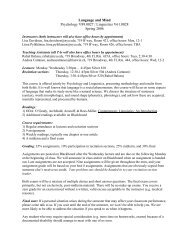Overt Nominative Subjects in Infinitival Complements Cross - NYU ...
Overt Nominative Subjects in Infinitival Complements Cross - NYU ...
Overt Nominative Subjects in Infinitival Complements Cross - NYU ...
You also want an ePaper? Increase the reach of your titles
YUMPU automatically turns print PDFs into web optimized ePapers that Google loves.
<strong>NYU</strong> Work<strong>in</strong>g Papers <strong>in</strong> L<strong>in</strong>guistics, Volume 2: Papers <strong>in</strong> Syntax, Spr<strong>in</strong>g 2009 13Szabolcsi (2005) discussed the control data above and tentatively concluded that Hungarian hasovert subjects <strong>in</strong> <strong>in</strong>f<strong>in</strong>itival complements.As we saw <strong>in</strong> the preced<strong>in</strong>g section, not only control but also rais<strong>in</strong>g complements exhibitthe phenomenon at hand. Szabolcsi (2005) mentioned examples with elkezd `beg<strong>in</strong>’ and thefuturate verb fog, but glossed over the fact that they <strong>in</strong>volve rais<strong>in</strong>g, not control. Bartos (2006a)and Márta Abrusán (p.c.) drew attention to their rais<strong>in</strong>g character. The arguments fromconstituent order apply to rais<strong>in</strong>g complements exactly as they do to control complements, so Iadd the brackets around the <strong>in</strong>f<strong>in</strong>itival clause right away.(40) Nem én kezdtem el [éjszaka dolgozni].not I began-1sg pfx at.night work.<strong>in</strong>fHI `It is not me who began to work at night’(41) Elkezdtem [nem én dolgozni éjszaka].began-1sg not I work-<strong>in</strong>f at.nightLO `It began to be the case that it is not me who works at night’(42) Csak én nem fogok [dolgozni éjszaka].only I not will-1sg work-<strong>in</strong>f at.nightHI `I am the only one who will not work at night’(43) Nem fogok [csak én dolgozni éjszaka].not will-1sg only I work-<strong>in</strong>f at.nightLO `It is not go<strong>in</strong>g to be the case that only I work at night’(44) Holnap fogok [m<strong>in</strong>denkivel csak én beszélni].tomorrow will-1sg everyone-with only I talk-<strong>in</strong>fLO `Tomorrow is the day when for everyone x, only I will talk with x’We conclude that <strong>in</strong>f<strong>in</strong>itival complements of both subject control verbs and subject-tosubjectrais<strong>in</strong>g verbs <strong>in</strong> Hungarian can conta<strong>in</strong> an overt nom<strong>in</strong>ative DP.2.3 “Our nom<strong>in</strong>ative DP” is the subject of the <strong>in</strong>f<strong>in</strong>itival clause2.3.1 An argument from B<strong>in</strong>d<strong>in</strong>g TheoryWe have seen that our nom<strong>in</strong>ative DP is located <strong>in</strong>side the <strong>in</strong>f<strong>in</strong>itival clause, but does it orig<strong>in</strong>atethere? One important argument comes from the B<strong>in</strong>d<strong>in</strong>g Theory.The crucial observation is that the nom<strong>in</strong>ative DP <strong>in</strong>side a control complement can only bea personal pronoun whereas the one <strong>in</strong>side a rais<strong>in</strong>g complement can be a referential DP. This isexactly as expected if the DP orig<strong>in</strong>ates <strong>in</strong> the complement clause. In the case of control, ournom<strong>in</strong>ative DP is bound by the matrix subject (an overt one or dropped pro). If the two are not <strong>in</strong>the same local doma<strong>in</strong>, a pronoun can be so bound (Condition B), but a referential expressioncannot (Condition C). Thus we do not expect to f<strong>in</strong>d lexical DPs <strong>in</strong> the subject position of thecontrol complement. Indeed, (46) is sharply degraded as compared to (45):


